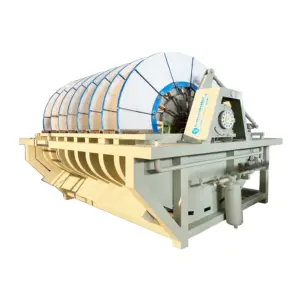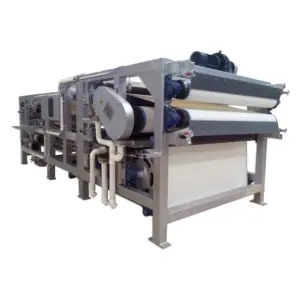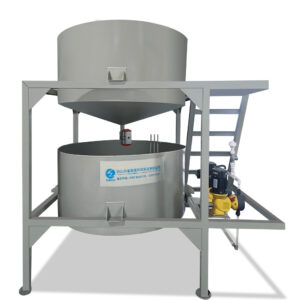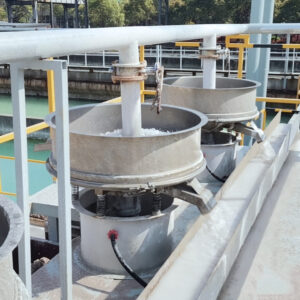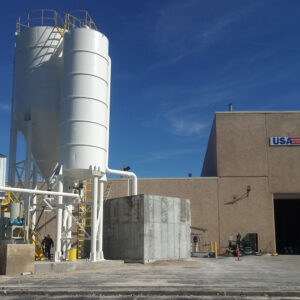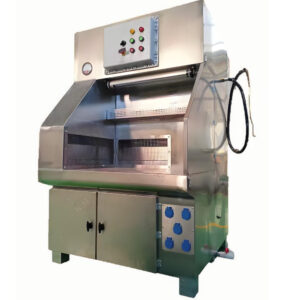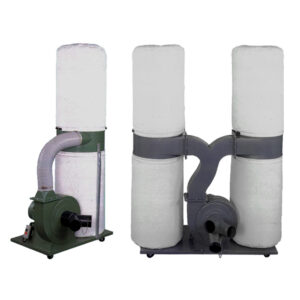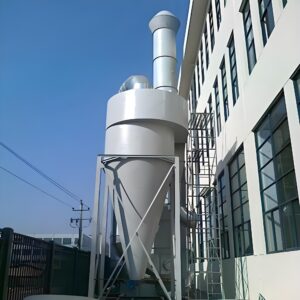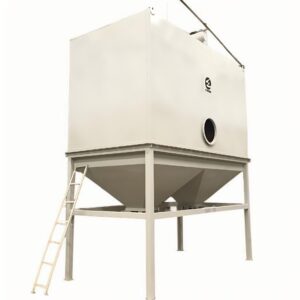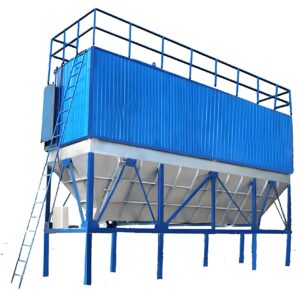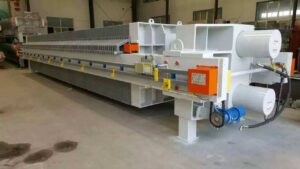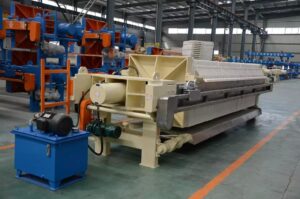올바른 찾기 여과 장비 공급업체 운영의 효율성, 규정 준수, 수익성을 좌우할 수 있습니다. 제조 시설, 시립 정수 처리장, 상업용 건물 등 어떤 시설을 관리하든 여과 시스템의 품질은 제품 품질부터 규정 준수, 운영 비용에 이르기까지 모든 것에 직접적인 영향을 미칩니다.
문제는 공급업체를 찾는 것뿐만 아니라 가장 필요할 때 일관된 품질, 기술 전문성, 신뢰할 수 있는 지원을 제공할 수 있는 공급업체를 파악하는 것입니다. 공급업체를 잘못 선택하면 장비 고장, 값비싼 다운타임, 잠재적인 규정 위반으로 이어져 수천만 달러의 벌금과 생산성 손실이 발생할 수 있습니다. 최근 업계 설문조사에 따르면 34%의 시설이 부적절한 필터 공급업체 지원으로 인해 심각한 운영 중단을 경험했으며, 또 다른 28%는 표준 이하의 장비 성능으로 인한 규정 준수 문제에 직면한 것으로 나타났습니다.
이 종합 가이드는 성공을 이끌어줄 필터링 공급업체를 식별, 평가 및 파트너로 선정하는 데 필요한 프레임워크, 평가 기준 및 내부 인사이트를 제공합니다. 검증된 공급업체 평가 방법론을 살펴보고, 업계 인증을 해독하며, 뛰어난 공급업체와 평범한 공급업체를 구분하는 핵심 성과 지표를 공개합니다. 이를 활용하여 포르부 클린 테크 전문 지식을 바탕으로 정보에 입각한 의사 결정을 내리면 운영 안정성을 높이는 동시에 비용을 최적화할 수 있습니다.
여과 장비 공급업체란 무엇이며 왜 중요한가요?
최신 여과 공급업체의 역할 정의
현대 여과 장비 공급업체 는 단순한 장비 공급업체가 아닌 종합 솔루션 제공업체로 기능합니다. 설계 엔지니어링, 제조 역량, 설치 서비스, 지속적인 기술 지원을 통합하여 초기 장비 공급을 훨씬 뛰어넘는 긴밀한 파트너십을 구축합니다.
산업 고객과 협력한 경험에 따르면, 가장 성공적인 공급업체 관계는 여과 구성 요소뿐만 아니라 전체 프로세스 워크플로우를 이해하는 회사와의 관계입니다. 이러한 공급업체는 애플리케이션별 엔지니어링을 통해 가치를 제공하여 시스템 성능을 최적화하는 동시에 총소유비용을 절감할 수 있도록 지원합니다. 최근 시장 분석에 따르면 풀서비스 공급업체와 협력하는 시설은 기본 장비만 사용하는 공급업체에 비해 유지보수 비용이 231% 낮고 장비 수명이 181% 더 길다고 합니다.
복잡한 산업용 애플리케이션을 다룰 때는 이러한 구분이 특히 중요합니다. 고성능 산업용 여과 시스템 규정 요구 사항을 탐색하고 기술 문서를 제공하며 중요한 운영 중에 신속한 대응 지원을 제공할 수 있는 공급업체가 필요합니다.
| 공급업체 유형 | 제공되는 서비스 | 일반적인 애플리케이션 |
|---|---|---|
| 풀서비스 제공업체 | 설계, 제조, 설치, 지원 | 복잡한 산업 프로세스 |
| 장비 전용 공급업체 | 표준 제품, 기본 문서 | 간단한 교체 애플리케이션 |
| 특수 제조업체 | 틈새 기술, 맞춤형 솔루션 | 전문 산업 요구 사항 |
산업 표준 및 인증 요건
전문 필터 공급업체는 제조 공정, 품질 시스템 및 기술 역량을 검증하는 여러 산업 인증을 보유하고 있습니다. ISO 9001 품질 관리 인증이 기본이 되지만, 주요 공급업체는 수처리 애플리케이션에 대한 NSF/ANSI 표준 및 압력 용기 구성 요소에 대한 ASME 인증과 같은 전문 인증도 보유하고 있습니다.
인증 환경은 애플리케이션 영역에 따라 크게 다릅니다. 수처리 공급업체는 일반적으로 음용수 시스템 구성 요소에 대해 NSF 61 인증을 유지하고, 산업용 공기 필터 공급업체는 전기 안전에 대한 UL 인증을 보유하고 있는 경우가 많습니다. 특히 새로운 오염 물질과 에너지 효율 표준을 중심으로 인증 요건이 계속 진화하고 있다는 점에 주목할 필요가 있습니다.
하지만 인증만으로는 공급업체의 성과를 보장할 수 없습니다. 광범위한 인증 포트폴리오가 없는 일부 소규모의 전문 공급업체가 인증을 받은 대형 경쟁업체에 비해 우수한 기술 혁신과 고객 서비스를 제공하는 경우가 종종 있습니다. 핵심은 어떤 인증이 특정 애플리케이션 요구 사항에 진정으로 영향을 미치는지 이해하는 데 있습니다.
신뢰할 수 있는 필터 장비 제조업체를 식별하는 방법은 무엇인가요?
공급업체 평가를 위한 핵심 성과 지표
평가 필터 장비 제조업체 마케팅 자료와 영업 프레젠테이션을 뛰어넘는 체계적인 접근 방식이 필요합니다. 가장 눈에 띄는 성과 지표는 홍보 지표보다는 운영 데이터와 고객 레퍼런스에서 드러나는 경우가 많습니다.
제조 설비 가동률은 공급업체의 안정성과 성장 궤도에 대한 중요한 인사이트를 제공합니다. 85~95%의 생산 능력을 갖춘 기업은 일반적으로 품질 관리를 유지하면서 강력한 시장 수요를 보이는 반면, 70% 미만 또는 98% 이상의 기업은 다른 문제에 직면할 수 있습니다. 리드 타임의 일관성은 또 다른 중요한 지표로 작용하는데, 신뢰할 수 있는 제조업체는 ±5% 편차 내에서 견적된 배송 일정을 일관되게 준수합니다.
특히 장기 파트너십의 경우 재무 안정성 지표에 주의를 기울일 필요가 있습니다. 매년 8~121조원의 매출이 꾸준히 성장하고 부채 비율이 0.4 미만인 기업은 일반적으로 지속 가능한 비즈니스 모델을 보여줍니다. 한 업계 전문가는 "최고의 필터 공급업체는 매출의 4~61%를 R&D에 투자하여 진화하는 기술 요건과 규제 변화에 앞서 나갈 수 있습니다."라고 말합니다.
품질 지표는 결함률, 보증 청구 빈도, 고객 유지율 통계를 통해 제조의 우수성을 보여줍니다. 상위권 제조업체는 일반적으로 0.2% 미만의 결함률과 90% 이상의 고객 유지율을 유지합니다. 이러한 수치는 제조 품질뿐만 아니라 설계 견고성 및 고객 서비스 효과도 반영합니다.
제조 역량 및 기술 표준
현대의 필터 제조에는 기본적인 제작을 넘어선 정교한 생산 역량이 필요합니다. 고급 공급업체는 자동화된 용접 시스템, 컴퓨터화된 테스트 프로토콜, 통합 품질 관리 시스템을 활용하여 생산 공정 전반에 걸쳐 일관된 제품 성능을 보장합니다.
제조 시설 내 기술 채택률은 공급업체의 혁신 역량을 나타냅니다. 선도적인 제조업체들은 IoT 모니터링, 예측 유지보수 시스템, 실시간 품질 추적 등 인더스트리 4.0 원칙을 구현했습니다. 이러한 역량은 제품 신뢰성과 고객 지원 효율성으로 직결됩니다.
한 제약 제조 시설의 사례 연구는 이러한 중요성을 잘 보여줍니다. 첨단 제조 역량을 갖춘 공급업체로 전환한 후 필터 요소 고장이 671건 감소하고 예기치 않은 유지보수 이벤트가 401건 감소했습니다. 공급업체의 자동화된 테스트 프로토콜은 이전 공급업체가 놓쳤던 미묘한 제조 변형을 감지하여 비용이 많이 드는 다운스트림 문제를 예방했습니다.
제조 유연성은 특히 맞춤형 애플리케이션의 경우 또 다른 중요한 역량입니다. 모듈식 생산 라인과 숙련된 인력을 갖춘 공급업체는 품질 저하나 리드 타임을 크게 늘리지 않고도 변화하는 요구사항에 적응할 수 있습니다.
| 기술 카테고리 | 기본 기능 | 고급 기능 | 품질에 미치는 영향 |
|---|---|---|---|
| 용접 시스템 | 수동 프로세스 | 자동화된 TIG/MIG | +15% 조인트 신뢰성 |
| 품질 관리 | 샘플 테스트 | 100% 검사 | +25% 결함 감소 |
| 디자인 도구 | 2D CAD 시스템 | 시뮬레이션을 통한 3D 모델링 | +30% 처음 오른쪽 |
어떤 유형의 여과 시스템 공급업체가 다양한 산업에 서비스를 제공하나요?
산업용 수처리 전문가
필터링 시스템 공급업체 산업용 수처리 전문 업체는 대량 처리, 정밀한 오염 물질 제거, 규정 준수가 필요한 애플리케이션에 중점을 둡니다. 이러한 공급업체는 일반적으로 복잡한 수질 문제를 해결하는 멤브레인 기술, 이온 교환 시스템 및 고급 산화 공정에 대한 광범위한 경험을 보유하고 있습니다.
산업용 용수 전문가는 프로세스 엔지니어링 역량과 애플리케이션별 전문성을 통해 차별화됩니다. 이들은 냉각탑 수처리, 보일러 급수 준비, 공정 용수 재활용 시스템의 복잡성을 잘 이해하고 있습니다. 업계 연구에 따르면 전문 수처리 공급업체와 협력하는 시설은 범용 공급업체를 사용하는 시설에 비해 수질 일관성이 22% 개선되고 화학물질 소비량은 19% 감소하는 것으로 나타났습니다.
수처리 전문가들의 기술 초점은 지속 가능한 솔루션과 에너지 효율로 크게 이동하고 있습니다. 선도적인 공급업체들은 이제 우수한 처리 성능을 유지하면서 이전 세대 장비보다 에너지 소비량이 30~401% 낮은 시스템을 제공합니다.
공기 여과 및 HVAC 장비 제공업체
공기 여과 공급업체는 상업용 HVAC 시스템부터 산업용 집진 및 클린룸 애플리케이션에 이르기까지 다양한 시장에 서비스를 제공합니다. 이러한 공급업체는 비용 효율성을 유지하면서 다양한 효율성 요구 사항, 공기 흐름 사양 및 설치 제약 조건을 해결해야 합니다.
HVAC 필터 전문가는 건물 시스템 통합, 에너지 소비 최적화, 유지보수 접근성에 대한 이해가 뛰어납니다. 이들은 공기 품질 요구 사항과 운영 비용의 균형을 맞추는 솔루션을 제공하며, 적절한 보호를 보장하면서 필터 수명을 최대화하는 단계별 여과 방식을 권장하기도 합니다.
산업용 공기 여과에는 고온 애플리케이션, 폭발성 대기 및 무거운 미립자 부하에 초점을 맞춘 다양한 전문 지식이 필요합니다. 최근 한 철강 가공 시설에서 진행된 프로젝트는 이러한 전문성의 가치를 입증했습니다. 선택한 공급업체의 집진 시스템은 작업장 미립자 수준을 78%까지 줄이면서 이전 설치보다 25% 더 효율적으로 작동했습니다.
제조용 공정 여과
제조 공정 여과에는 각 산업 분야의 생산 워크플로, 오염원 및 품질 요구 사항을 이해하는 공급업체가 필요합니다. 이러한 공급업체는 일반적으로 여과가 제품 품질에 직접적인 영향을 미치는 제약, 식음료, 화학 처리 또는 자동차 애플리케이션을 전문으로 합니다.
공정 여과 공급업체는 검증 지원, 규제 전문성, 오염 분석 역량을 통해 차별화됩니다. 이들은 기존 품질 시스템과의 원활한 통합을 보장하는 포괄적인 문서 패키지, 변경 관리 절차 및 자격 인증 프로토콜을 제공합니다.
가장 성공적인 공정 여과 파트너십에는 지속적인 개선 이니셔티브에 참여하는 공급업체가 참여하여 최적화 기회를 파악하고 제품 품질과 운영 효율성을 모두 개선하는 향상된 여과 전략을 구현하는 데 도움을 줍니다.
필터 장비 공급업체 리뷰를 효과적으로 사용하는 방법은 무엇인가요?
고객 피드백 및 성능 데이터 분석
필터 장비 공급업체 리뷰 는 액면 그대로 받아들이기보다는 체계적으로 분석할 때 가치 있는 인사이트를 제공합니다. 가장 유용한 리뷰에는 요구 사항과 의미 있는 비교를 가능하게 하는 구체적인 성능 데이터, 애플리케이션 세부 정보 및 기간 정보가 포함되어 있습니다.
효율성 개선, 유지보수 빈도 변경, 비용 영향 등의 지표를 사용하여 결과를 정량화한 리뷰를 찾아보세요. 세부 정보가 뒷받침되지 않은 일반적인 긍정 또는 부정적인 의견은 의사 결정에 제한적인 가치를 제공합니다. 산업별 리뷰는 일반적인 피드백보다 더 큰 비중을 차지하며, 특히 애플리케이션이 사용 목적과 밀접하게 일치하는 경우 더욱 그렇습니다.
리뷰 시기 패턴을 통해 중요한 공급업체의 특성을 파악할 수 있습니다. 여러 해에 걸쳐 일관된 긍정적인 피드백은 안정적인 성과를 나타내는 반면, 최근의 리뷰 클러스터는 진정한 고객 만족보다는 마케팅 캠페인을 암시할 수 있습니다. 최고의 공급업체 중 일부는 고객이 관계를 보호할 가치가 있는 경쟁 우위로 간주하기 때문에 온라인 리뷰 수가 적다는 점에 주목할 필요가 있습니다.
업계 간행물과 무역 협회의 인정을 통한 제3자 검증은 고객 리뷰만으로 평가하는 것보다 더 신뢰할 수 있는 평가를 제공하는 경우가 많습니다. 전문 기관으로부터 반복적으로 인정을 받는 공급업체는 일반적으로 여러 성과 측면에서 지속적인 우수성을 입증합니다.
타사 인증 및 업계 인정
공인 기관의 산업 인증은 공급업체의 역량과 성능 표준에 대한 객관적인 검증을 제공합니다. 수처리 장비에 대한 NSF 인증, 전기 부품에 대한 UL 등재, 압력 용기에 대한 ASME 코드 준수는 경쟁 차별화 요소가 아닌 최소한의 요구 사항입니다.
ISO 14001 환경 관리 및 OHSAS 18001 안전 관리와 같은 고급 인증은 공급업체가 지속 가능하고 책임감 있는 운영을 위해 최선을 다하고 있음을 나타냅니다. 이러한 인증은 우수한 제품 성능을 보장하지는 않지만 운영 우수성 및 장기적인 신뢰성과 관련이 있는 경우가 많습니다.
업계 수상 및 협회 파트너십을 통한 전문가 인정은 기술 커뮤니티 내에서 공급업체의 평판을 나타냅니다. 수질 협회나 미국 여과 및 분리 협회와 같은 조직에서 지속적으로 인정받는 기업은 일반적으로 강력한 기술 역량과 고객 중심을 유지합니다.
산업용 여과 공급업체에서 무엇을 찾아야 할까요?
기술 지원 및 애프터 서비스
산업용 여과 공급업체 는 초기 장비 가격보다는 주로 기술 지원 품질과 응답성을 통해 차별화됩니다. 가장 가치 있는 공급업체는 장비 수명 주기 전반에 걸쳐 애플리케이션 엔지니어링 지원, 문제 해결 지원, 성능 최적화 지침을 제공합니다.
기술 지원에 대한 응답 시간 약속은 공급업체마다 크게 다릅니다. 선도적인 기업은 일반적으로 중요한 문제에 대해 4시간 이내에 응답을 보장하고 미션 크리티컬 애플리케이션에 대해 연중무휴 24시간 긴급 지원을 제공합니다. 이러한 지원 수준은 예기치 않은 다운타임이 발생했을 때 매우 중요한데, 1시간의 지연으로 수천 달러의 생산 손실이 발생하기 때문입니다.
기술 지원 품질은 직원의 전문성과 리소스 할당에 따라 크게 달라집니다. 다양한 산업 분야에 대한 전담 애플리케이션 엔지니어를 보유한 공급업체는 일반 기술 지원 직원을 사용하는 공급업체보다 더 관련성 높은 가이드를 제공합니다. 경험상 기술 지원 역량에 매출의 8~121%를 투자하는 공급업체는 훨씬 더 나은 고객 결과를 제공합니다.
한 시립 정수장 사례 연구는 이러한 중요성을 잘 보여줍니다. 1차 여과 시스템에 예상치 못한 효율 저하가 발생하자 공급업체의 기술팀은 6시간 이내에 이전에 알려지지 않은 오염원을 파악하여 임시 해결책을 제시하는 동시에 영구적인 해결책을 마련했습니다. 신속한 대응으로 잠재적인 규정 위반을 방지하고 50,000명의 주민을 위한 서비스 연속성을 유지할 수 있었습니다.
사용자 지정 기능 및 엔지니어링 지원
커스터마이징 기능은 상용 장비 공급업체와 진정한 솔루션 공급업체를 구분합니다. 최고 여과 장비 공급업체 표준 제품을 수정하거나 고유한 애플리케이션을 위한 완벽한 맞춤형 솔루션을 개발할 수 있는 사내 엔지니어링 팀을 유지합니다.
엔지니어링 지원에는 초기 시스템 설계, 설치 안내, 시운전 지원, 지속적인 최적화 지원이 포함되어야 합니다. 강력한 엔지니어링 역량을 갖춘 공급업체는 초기 사양 개발 과정에서 파악하지 못했던 비용 절감 기회나 성능 개선 사항을 파악할 수 있는 경우가 많습니다.
하지만 사용자 지정 기능에는 장단점이 있습니다. 고도로 맞춤화된 시스템은 배송 시간이 길고 초기 비용이 높으며 유지 관리 요구 사항이 더 복잡할 수 있습니다. 핵심은 불필요한 복잡성 없이 표준 제품을 애플리케이션에 맞게 최적화할 수 있는 공급업체를 찾는 것입니다.
엔지니어링 지원 품질은 여러 시스템 통합 지점을 포함하는 복잡한 설치의 경우 특히 중요합니다. 상세한 설치 도면, 인터페이스 사양 및 시운전 절차를 제공하는 공급업체는 설치 위험과 시작 시간을 크게 줄여줍니다.
| 지원 카테고리 | 기본 서비스 | 고급 서비스 | 프리미엄 서비스 |
|---|---|---|---|
| 응답 시간 | 24-48시간 | 4-8시간 | 1-2시간 |
| 기술 직원 | 일반 지원 | 애플리케이션 전문가 | 전담 엔지니어 |
| 문서 | 표준 매뉴얼 | 사용자 지정 절차 | 완벽한 유효성 검사 패키지 |
글로벌 여과 장비 시장을 탐색하는 방법은?
품질 기준의 지역적 차이
글로벌 여과 장비 공급업체 디렉토리 연구에 따르면 지역마다 제조 표준, 품질 관리 관행, 기술 역량에 상당한 차이가 있는 것으로 나타났습니다. 이러한 차이를 이해하면 비용 및 성능 기대치를 관리하면서 공급업체 선정 전략을 최적화하는 데 도움이 됩니다.
유럽 공급업체는 일반적으로 포괄적인 규제 프레임워크와 강력한 엔지니어링 전통에 따라 엄격한 품질 표준을 유지합니다. 독일과 스위스 제조업체는 특히 정밀 제조와 기계적 신뢰성에서 뛰어나지만 가격대가 높은 경우가 많습니다. 스칸디나비아 공급업체는 환경 지속 가능성 및 에너지 효율성 혁신을 선도합니다.
아시아 제조업체들은 지난 10년 동안 품질 기준을 크게 향상시켰으며, 현재 많은 제조업체들이 서구의 품질 수준과 비슷하거나 이를 능가하고 있습니다. 특히 중국 공급업체는 대량 생산과 비용 경쟁력에서 뛰어나며, 일본과 한국 기업은 첨단 기술 통합과 정밀 제조에 주력하고 있습니다.
북미 공급업체는 일반적으로 애플리케이션 엔지니어링 지원과 신속한 대응 능력을 강조하며, 지리적 이점과 규제에 대한 친숙함을 활용합니다. 그러나 제조 비용으로 인해 해외 공급업체에 비해 높은 가격을 책정하는 경우가 많습니다.
지역별 인증 요건은 글로벌 소싱을 더욱 복잡하게 만듭니다. 유럽 CE 표준에 따라 제조된 장비는 북미 시장을 위해 추가 테스트가 필요할 수 있으며, 미국 애플리케이션용으로 인증된 제품은 해외 사용을 위해 추가 문서가 필요할 수 있습니다.
비용 대 품질 고려 사항
비용과 품질의 균형을 맞추려면 단순한 초기 가격 비교보다는 정교한 총소유비용 분석이 필요합니다. 선도적인 공급업체는 우수한 효율성, 더 긴 서비스 수명, 유지보수 요구 사항 감소를 통해 프리미엄 가격을 상쇄하는 더 높은 초기 가치를 제공하는 경우가 많습니다.
장비 수명 주기 비용은 일반적으로 초기 구매 가격 25%, 에너지 소비 35%, 유지보수 및 교체 부품 25%, 설치 및 시운전 15%로 나뉩니다. 이러한 비율을 이해하면 공급업체의 우수성이 가치에 가장 큰 영향을 미치는 부분을 파악하는 데 도움이 됩니다.
품질 차이는 신뢰성 지표와 유지보수 요건에서 가장 명확하게 드러납니다. 프리미엄 공급업체는 예산 대안에 비해 서비스 주기가 2~3배 더 길고 계획되지 않은 유지보수 이벤트가 40~601% 더 적은 경우가 많습니다. 중요한 애플리케이션의 경우 이러한 안정성 향상은 다운타임 위험 감소를 통해 상당한 가치를 제공합니다.
화학 처리 시설 비교를 통해 이러한 장단점을 확인할 수 있습니다. 초기 비용이 40% 높은 프리미엄 여과 장비는 뛰어난 효율성과 유지보수 요구 사항 감소로 5년 동안 총 운영 비용을 52% 낮췄습니다. 또한 이 설비는 초기 가격 프리미엄보다 훨씬 더 많은 비용이 들었을 세 번의 잠재적 생산 중단을 피할 수 있었습니다.
결론
오른쪽 선택 여과 장비 공급업체 초기 가격 책정 및 마케팅 프레젠테이션을 훨씬 뛰어넘는 체계적인 평가가 필요합니다. 가장 성공적인 파트너십은 공급업체가 거래 관계보다는 포괄적인 기술 역량, 입증된 신뢰성 기록, 장기적인 고객 성공에 대한 헌신을 보여줄 때 형성됩니다.
주요 평가 기준은 초기 장비 비용에만 초점을 맞추기보다는 제조 품질 지표, 기술 지원 대응력, 맞춤화 역량, 총 소유 비용에 중점을 두어야 합니다. 업계 인증은 중요한 기준 검증을 제공하지만, 운영 성과 데이터와 고객 참조는 실제 공급업체 역량에 대한 더 의미 있는 인사이트를 제공합니다.
글로벌 여과 시장은 지속 가능성, 디지털화, 성능 최적화를 향해 계속 진화하고 있으며, 장기적인 성공을 위해 공급업체의 혁신 역량이 점점 더 중요해지고 있습니다. 오늘날 선진 공급업체에 투자하는 기업은 업계의 미래를 좌우할 새로운 기술과 규제 요건의 혜택을 누릴 수 있는 위치에 있습니다.
입증된 신뢰성과 포괄적인 지원이 필요한 즉각적인 여과 장비가 필요한 경우 다음을 살펴보세요. 전문 여과 솔루션 기술적 우수성과 신속한 고객 서비스를 결합한 공급업체를 찾아야 합니다. 우수한 공급업체 관계에 대한 투자는 운영 안정성 향상, 유지보수 비용 절감, 규정 준수 강화를 통해 결실을 맺습니다.
어떤 특정 여과 문제에 직면해 있으며, 올바른 공급업체 파트너십을 통해 운영 효율성을 어떻게 혁신할 수 있을까요? 오늘 선택하는 공급업체는 향후 수년간 시설의 성능, 비용 및 경쟁력에 큰 영향을 미칩니다.
자주 묻는 질문
Q: 필터링 장비 공급업체에서 어떤 유형의 필터링 장비를 찾을 수 있나요?
A: 여과 장비 공급업체는 다음과 같은 다양한 업계 요구 사항을 충족하는 광범위한 제품을 제공합니다:
- 중력 필터
- 진공 필터
- 원심 필터
- 멤브레인 여과 시스템
- 응집 필터 및 심층 여과 백과 같은 특수 여과 기술
이러한 공급업체는 수처리, 산업 공정, 공기 여과 및 연료 정화를 위한 맞춤형 시스템을 제공하는 경우가 많습니다. 올바른 유형을 선택하는 것은 특정 애플리케이션과 여과 요구 사항에 따라 달라집니다.
Q: 여과 장비 디렉토리와 리뷰가 올바른 공급업체를 선택하는 데 어떻게 도움이 되나요?
A: 필터링 장비 디렉토리 및 리뷰는 중앙 집중식 리소스를 제공합니다:
- 여러 공급업체 및 제조업체를 쉽게 비교
- 고객 피드백 및 제품 성능 인사이트 읽기
- 기능 및 인증을 포함한 자세한 회사 프로필에 액세스하세요.
- 업계 전문성, 제품 범위, 고객 서비스를 기준으로 공급업체를 평가하세요.
이 정보는 운영 요구 사항과 예산에 맞는 정보에 입각한 선택을 내리는 데 도움이 됩니다.
Q: 어떤 산업에서 이러한 공급업체의 여과 장비를 주로 사용하나요?
A: 여과 장비는 다음과 같은 산업 전반에 걸쳐 널리 사용됩니다:
- 석유화학 및 연료 처리
- 식음료 생산
- 제약 제조
- 물 및 폐수 처리
- 산업 기계 유지보수
공급업체는 효율적이고 규정을 준수하는 필터링을 보장하기 위해 이러한 부문의 규제 및 기술 요구 사항을 충족하는 솔루션을 전문적으로 제공하는 경우가 많습니다.
Q: 여과 장비 공급업체가 맞춤형 엔지니어링 솔루션을 제공할 수 있나요?
A: 예, 많은 여과 장비 공급업체가 정확한 공정 요구 사항에 따라 여과 시스템을 맞춤 설계 및 엔지니어링 서비스를 제공합니다. 여기에는 다음이 포함됩니다:
- 특정 액체 또는 가스 애플리케이션을 위한 여과 시스템 설계
- 기존 프로세스 라인에 필터링 통합
- 최적의 성능과 비용 효율성을 위한 기술 컨설팅 제공
맞춤형 솔루션은 여과 장비가 고객의 운영 과제에 완벽하게 부합하도록 보장합니다.
Q: 여과 장비 공급업체와 그 제품을 검토할 때 고려해야 할 사항은 무엇인가요?
A: 고려해야 할 주요 요소는 다음과 같습니다:
- ISO 9001과 같은 품질 인증
- 업계 내 공급업체 경험 및 평판
- 제공되는 여과 제품의 범위 및 기술
- 기술 지원 및 애프터 서비스 이용 가능 여부
- 장비 배송 가격 및 리드 타임
이러한 측면을 평가하면 필터링 투자가 안정적이고 장기적인 결과를 가져올 수 있습니다.
Q: 여과 장비 공급업체는 유지 관리 및 최적화를 어떻게 지원하나요?
A: 선도적인 여과 장비 공급업체는 다음과 같은 지속적인 지원을 제공합니다:
- 예비 부품 공급 및 교체 필터
- 예약된 유지 관리 서비스
- 시스템 성능 모니터링 및 최적화 조언
- 문제 해결 및 기술 지원
이 지속적인 파트너십은 필터링 효율성을 유지하고 시스템 수명을 연장하는 데 도움이 됩니다.
외부 리소스
- 여과 장비 공급업체 제조업체 | IQS 디렉토리 - 주요 여과 장비 공급업체 및 제조업체의 자세한 프로필, 제품 설명, 리뷰가 포함된 종합 디렉토리입니다.
- 여과 장비 제조업체 공급업체 | 필터링 시스템 - 신뢰할 수 있는 여과 장비 제조업체의 선별된 디렉토리와 비교 도구, 기술 상담, 고객 리뷰를 제공하여 정보에 입각한 공급업체 선택을 돕습니다.
- 여과 시스템 제조업체 및 공급업체 - IQS 디렉토리 - 자세한 회사 프로필, 고객 리뷰, 직접 견적 요청 옵션과 함께 최고의 여과 시스템 제조업체 및 공급업체를 나열합니다.
- 표준화된 공기 여과 장비의 상위 6대 산업 공급업체 - 제품 품질 및 회사 평판에 대한 인사이트를 포함하여 주요 산업용 공기 여과 장비 공급업체에 대한 전문가 리뷰 및 순위를 제공합니다.
- 2025년 최고의 정수 필터 5가지 | 테스트 및 평가 - 테크기어랩 - 다양한 용도에 가장 적합한 정수 필터 장비에 대한 심층적인 리뷰와 비교 정보를 제공하여 사용자가 안심하고 선택할 수 있도록 도와줍니다.
- 여과 장비 제조업체 디렉토리 - ThomasNet(추천 리소스) - 북미 시장에 대한 회사 개요 및 사용자 피드백이 포함된 광범위한 여과 장비 공급업체 목록을 제공하는 권위 있는 디렉토리입니다.
